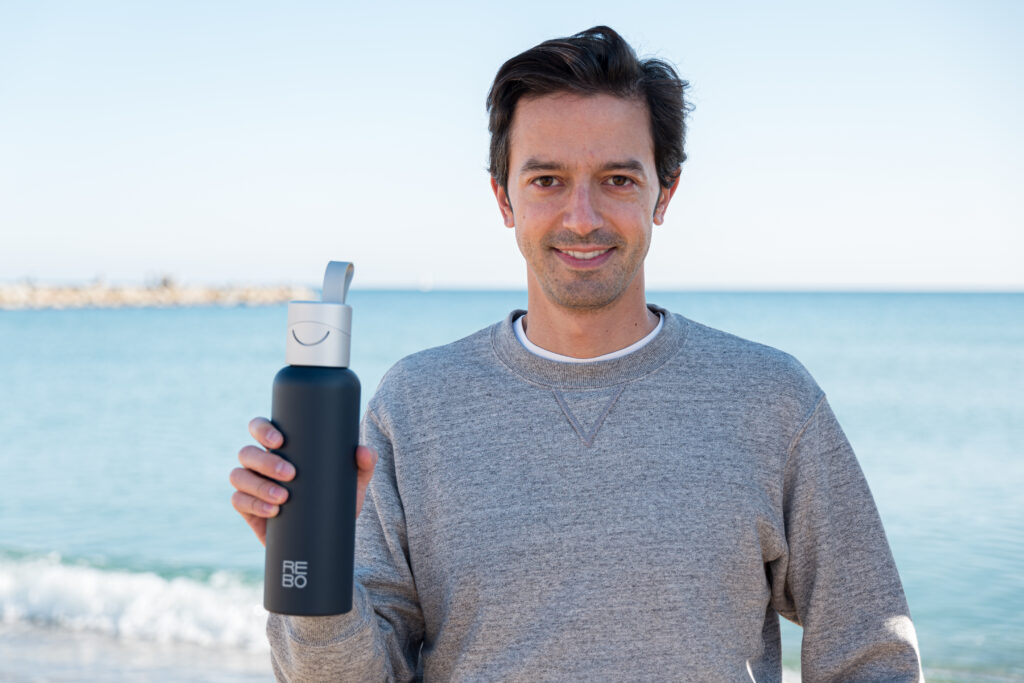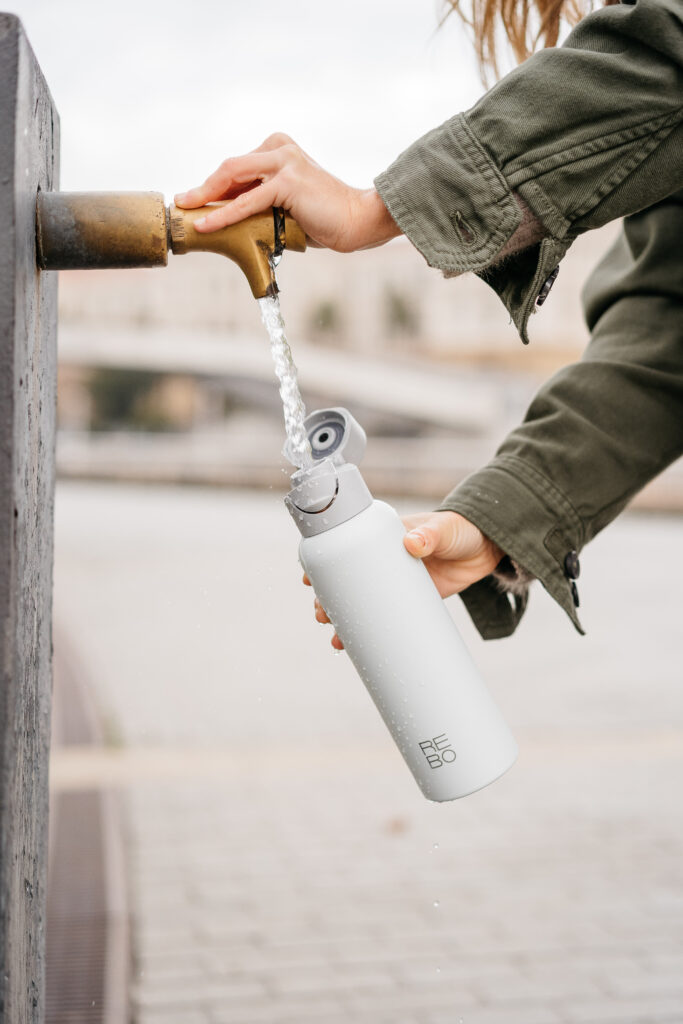PierAndrea Quarta is the founder and CEO of REBO, a Swiss startup working towards sustainable drinking. Their goals: Making water good for you and good for the environment.
While doing his degree in business he fell in love with marketing. It is during his time at Procter&Gamble that he got the idea for REBO.

Could you please tell us more about yourself, about how you came to have the idea for REBO?
In my “previous life” I was a marketing director at Procter&Gamble where I spent about 8 years. In 2016, I was assigned to lead sustainability for the brand that I was working for Head&Shoulders. Not everybody knows it but Head&Shoulders is the number one shampoo brand in the world, selling roughly 1 billion bottles every year.
At first, I wasn’t clear about what the focus of my brand’s sustainability strategy should be. However, after reading “The New Plastic Economy” from the Ellen MacArthur Foundation, I realized the magnitude of the plastic waste problem. I was caught by the fact that by 2050 there could be more plastic than fish in the ocean, and it was clear to me that this should be the focus of our strategy. So, we came up with the idea of making a shampoo bottle out of plastic collected in the ocean.
One year later we launched this bottle at the WEF (World Economic Forum) and won the UN Momentum for Change award. The product was also a commercial success, and it inspired P&G and many other companies to push the boundaries in sustainability.
This experience also inspired me to do much more and gave me the idea for REBO. With big problems often come opportunities, and in this case, it’s the fact that plastic pollution is triggering consumer behaviors changes. So, I said to myself that if I could create a company that can have a positive impact, plus can be a viable business, then that would be fantastic. So REBO was born and it makes me proud of doing what I do today.

That’s a great origin story! As you mentioned, your goal is to reduce plastic waste, especially in the ocean. How are your clients doing this reduction in plastic?
If you think about the problem of plastic waste, you need to think about it like a faucet. A faucet with water overrunning and you need to think about a solution.
The first thing that you want to do is you want to turn off the faucet, stopping the production of plastic. But then once you’ve done it, there’s going to be so much water in the house that you need to mop that water, and that is removing all the waste generated to date.
Within our app, we have 230,000 public fountains that are mapped, so we make sure that you can find refilling spots!
With REBO we’re trying to do both things. On one hand, we’re helping people to turn off that faucet. And on the other hand, we’re giving a tool to people to remove that kind of excess that has been produced so far.
How do we do this? First, by being an alternative to single-use plastic water bottles, a bottle that you can refill, in water fountains, instead of having to buy a plastic one. And within our app, we have 230,000 public fountains that are mapped, so we make sure that you can find refilling spots!
Second, because of the technology that we have inside our bottles we’re able to know how much plastic you’re saving. We get it certified by GoldStandard, enabling us to transform it into a credit to fund the collection of plastic waste. This is a new business model that we came up with, enabling us to collect one bottle of plastic waste for every bottle drunk with REBO.
And so, with this, you can see how we are turning off the faucet while mopping the water as well!

Sustainable food or sustainable drink: People usually think about it as purely on the environmental side, but there’s also the healthy side for yourself. How does REBO help you stay in shape and where do you have this healthy for yourself aspect?
Water is an essential element: You can go for a few days without eating, but you can’t go for a lot of time without drinking.
We built into the product a technology that enables you to track the water inside the bottle and we do this for two main reasons: One is good for you and the other one is good for the planet.
Good for you. Is the fact that thanks to the app, we’re able to create a customized hydration plan according to your physical activity, and your lifestyle. And we’re able to update this dynamically as you are running, as you’re going for a walk, etc.
Thanks to the REBO smart cap we measure the level of water every time you take a sip, transfer that information to the REBO app, and keep track of how hydrated you are vs the customized goal we create. When you are not drinking enough, we will send you reminders through the app and through the LED built into the bottle. At the same time, we use that same data to note the amount of plastic that you’re saving, and we track this in the app, along with the plastic waste that is collected on your behalf.
This is good for you and good for the planet, and as you said, I think this is going in the direction of a more comprehensive definition of sustainability.
We know you want to reduce plastic waste and stop plastic usage. Do you have any plans to continue this launch of alternatives to plastic or is the bottle the product you want to focus on?
Our company is not called REBO it’s actually called the RE-COMPANY. Our belief is to stop, rewind and try to do things in a different way; Reinvent things by reducing, reusing, and recycling. And REBO was the first product that we decided to work on, and that’s where the name comes from. It’s the RE from the company name and BO from the bottle: It’s truly a reinvented bottle.
Our vision is to work on multiple products. When we started to work on the bottle, we realized that it wasn’t just about a bottle, but it was about the way people get their hydration and the way people drink, we said this may be bigger than we initially anticipated, we initially thought.
The focus has really been on the bottle as a part of an ecosystem. We wanted the bottle to be a part of the future of hydration. There are very clear facts that show how the biggest producer of bottled water are venturing into alternative business models where they have dispensing water fountains.
Do you think REBO is a steppingstone to stopping plastic usage?
I don’t think I should be the judge, but I like to think that we can be a steppingstone. At least, that was the reason why we did it. We wanted to help on reducing the use of plastic and, most importantly, shift away from the single-use mentality, which is the real issue around plastic.
I think if we are really focused on being part of a broader ecosystem, that’s how we can drive even more impact. Leading players in the bottled water industry are trialing new business models by launching innovative hydration stations. Nevertheless, people need to carry durable bottles with them in order for these new solutions to succeed. At the same time, if people have durable bottles, but they don’t know where to refill them there is a limit to adoption. So, the real potential can be unleashed when these two things work in combination.
So basically, you would be fitting into a circular economy of water?
Yeah, absolutely. Circularity and water are at the core of what we do, and the circular economy of water can really come to life when the future described above becomes a reality.
Thanks a lot for your time, PierAndrea. We can’t wait to see what’s next for REBO!
Disclaimer:
The content of any publication on this website is for informational purposes only.




